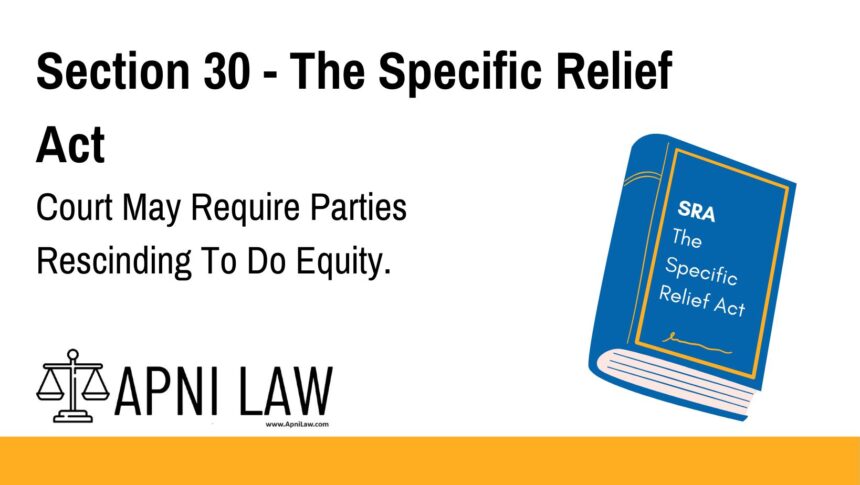Code: Section 30 – The Specific Relief Act
Section 30.
On adjudging the rescission of a contract, the court may require the party to whom such relief is granted to restore, so far as may be, any benefit which he may have received from the other party and to make any compensation to him which justice may require.
Explanation of Section 30 – The Specific Relief Act
Overview
Section 30 of The Specific Relief Act ensures fairness when a contract is rescinded. It grants the court the discretion to order the party benefiting from the rescission to restore the benefits received from the other party. Additionally, the court may require the rescinding party to compensate the other party if justice so demands. This provision ensures that the party whose contract is rescinded is not unjustly enriched, and both parties are treated fairly in light of the rescission.
Key Provisions
- Restoration of Benefits: When a contract is rescinded, the party benefiting from the rescission may be required to restore any benefits they received from the other party.
- Compensation for Justice: The court may also require the rescinding party to provide compensation to the other party if necessary, based on the circumstances of the case. This ensures fairness and equity.
- Equitable Relief: The essence of this provision is to ensure that rescission is not used as an unfair advantage. The rescinding party cannot unjustly retain any benefits that they received from the other party.
Illustration
Example 1: Restoring a Benefit After Rescission
A seller rescinds a contract for the sale of goods after a breach by the buyer. The buyer, however, has already received goods and paid for them partially. The court, after rescinding the contract, orders the buyer to return the goods to the seller, or if returning is not possible, to compensate the seller for the value of the goods.
Example 2: Compensation After Rescission
A person enters into a contract to purchase a piece of land but later rescinds the contract. However, the seller had already made improvements on the property based on the contract. The court, upon rescinding the contract, may order the buyer to compensate the seller for the cost of improvements or for any loss incurred.
Common Questions and Answers on Section 30 – The Specific Relief Act
1. What is meant by “restoring benefits” under Section 30?
- Answer: Restoring benefits means that the party who has benefited from the rescinded contract must return any property or compensation received under the contract. If returning the property is not possible, compensation may be required instead.
2. Can the court require compensation after rescission of a contract?
- Answer: Yes, the court may order the party seeking rescission to compensate the other party if justice requires it, especially if the other party has incurred losses due to the rescission.
3. When can a party be required to restore benefits or pay compensation?
- Answer: A party may be required to restore benefits or provide compensation when the contract is rescinded, and the court deems it necessary for fairness or equity, ensuring that no party is unfairly enriched or harmed by the rescission.
4. Can this provision apply to all types of contracts?
- Answer: Yes, Section 30 applies broadly to all contracts where rescission is granted, as long as the circumstances require restoration of benefits or compensation to be made.
Conclusion
Section 30 of The Specific Relief Act ensures that rescission of a contract is not used to unfairly benefit one party at the expense of the other. The court has the authority to order the party benefiting from rescission to restore any received benefits and provide compensation if required, ensuring equity and fairness for both parties involved.








